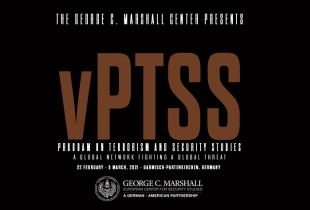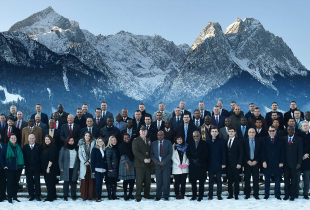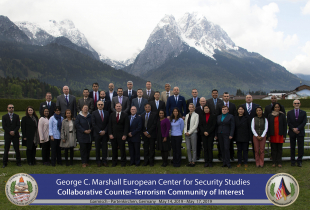
Marshall Center Participants Study How to Counter Terrorist Hostage, Kidnapping
By Christine June
Public Affairs Office
George C. Marshall European Center for Security Studies
GARMISCH-PARTENKIRCHEN, Germany (Aug. 3, 2015) – Dr. Adam Dolnik, professor of Terrorism Studies at the University of Wollongong in Australia and a former professor of Counterterrorism at the George C. Marshall European Center for Security Studies, gave lectures on Hostage Barricade and Terrorist Kidnapping to 75 participants from 51 countries attending the Program in Terrorism and Security Studies Aug. 3 at the Marshall Center here.
The PTSS course addresses numerous aspects of a threat that confronts nations around the globe. The four-week course is designed for government officials, military officers and police administrators currently working in mid- and upper- level management positions of counterterrorism organizations throughout the world.
Dolnik discussed “The ‘New’ Terrorism in terms of increasing lethality, religion dominates, transnational networks, advanced technologies, increased striking poser, knowledge of response, synchronized targeting, decentralized leadership and suicide terrorism.
In the past, Dolnik has also served as chief trainer at the International Centre for Political Violence and Terrorism Research in Singapore, and as a researcher at the Weapons of Mass Destruction Terrorism Research Project at the Monterey Institute of International Studies in California and at the United Nations Terrorism Prevention Branch in Vienna.
Dolnik has delivered lectures and training courses on terrorism and hostage negotiation for various governmental and nongovernmental organizations and agencies in more than 50 countries, and regularly conducts field research in conflict zones such as North Caucasus, Afghanistan, Pakistan, Uganda, Sudan, Southern Philippines and Colombia.
The PTSS 15-7 participants hail from: Afghanistan; Albania; Armenia; Bangladesh; Belize; Bosnia and Herzegovina; Botswana; Cameroon; Costa Rica; Croatia; Czech Republic; Dominican Republic; Egypt; Estonia; Georgia; Germany; Greece; Hungary; Ireland; Italy; Kenya; Kosovo; Kyrgyzstan; Latvia; Macedonia; Malaysia; Mali; Malta; Mauritania; Mauritius; Moldova; Morocco; Nigeria; Pakistan; Peru; Philippines; Poland; Romania; Rwanda; Senegal; Serbia; Sierra Leone; South Africa; South Korea; Tanzania; Thailand; Togo; Tunisia; Uganda; United States; and, Uzbekistan.
The mission of the Marshall Center, as a vital instrument of German-American cooperation, is to create a more stable security environment by advancing democratic institutions and relationships; promoting active, peaceful, whole-of-government approaches to address transnational and regional security challenges; and, creating and enhancing enduring partnerships worldwide.


